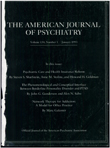Characterization of depression in war-related posttraumatic stress disorder
Abstract
OBJECTIVE: Many patients with posttraumatic stress disorder (PTSD) have symptoms of depression, but operationalized psychological constructs related to depression have not been used extensively in characterizing affective symptoms of PTSD. The authors' objective is to better characterize the affective component of PTSD. METHOD: The subjects were 45 male psychiatric inpatients at a Veterans Administration medical center; 28 met DSM-III-R criteria for PTSD and 17 met Research Diagnostic Criteria (RDC) for major depressive disorder. All of the subjects with PTSD were Vietnam veterans. The 21-item Hamilton Rating Scale for Depression was used to assess state measures of symptom severity, and the Depressive Experiences Questionnaire was used to measure dimensions of dependency, self-criticism, and self-efficacy. RESULTS: The mean total Hamilton scale score of the patients with PTSD was nonsignificantly higher than that of the patients with major depressive disorder; patients with PTSD had higher scores on almost all individual Hamilton symptoms, particularly insomnia, somatic anxiety, and diurnal variation. Patients with PTSD had significantly higher scores on the self-criticism scale but not on the dependency and self- efficacy scales of the Depressive Experiences Questionnaire. The scores of patients with PTSD on the dependency and self-criticism scales were negatively correlated. No significant differences between patients with PTSD with and without concurrent major depressive disorder were observed. CONCLUSIONS: Characterization of such depressive dimensions of PTSD as dependency and self-criticism may have important clinical implications.
Access content
To read the fulltext, please use one of the options below to sign in or purchase access.- Personal login
- Institutional Login
- Sign in via OpenAthens
- Register for access
-
Please login/register if you wish to pair your device and check access availability.
Not a subscriber?
PsychiatryOnline subscription options offer access to the DSM-5 library, books, journals, CME, and patient resources. This all-in-one virtual library provides psychiatrists and mental health professionals with key resources for diagnosis, treatment, research, and professional development.
Need more help? PsychiatryOnline Customer Service may be reached by emailing [email protected] or by calling 800-368-5777 (in the U.S.) or 703-907-7322 (outside the U.S.).



